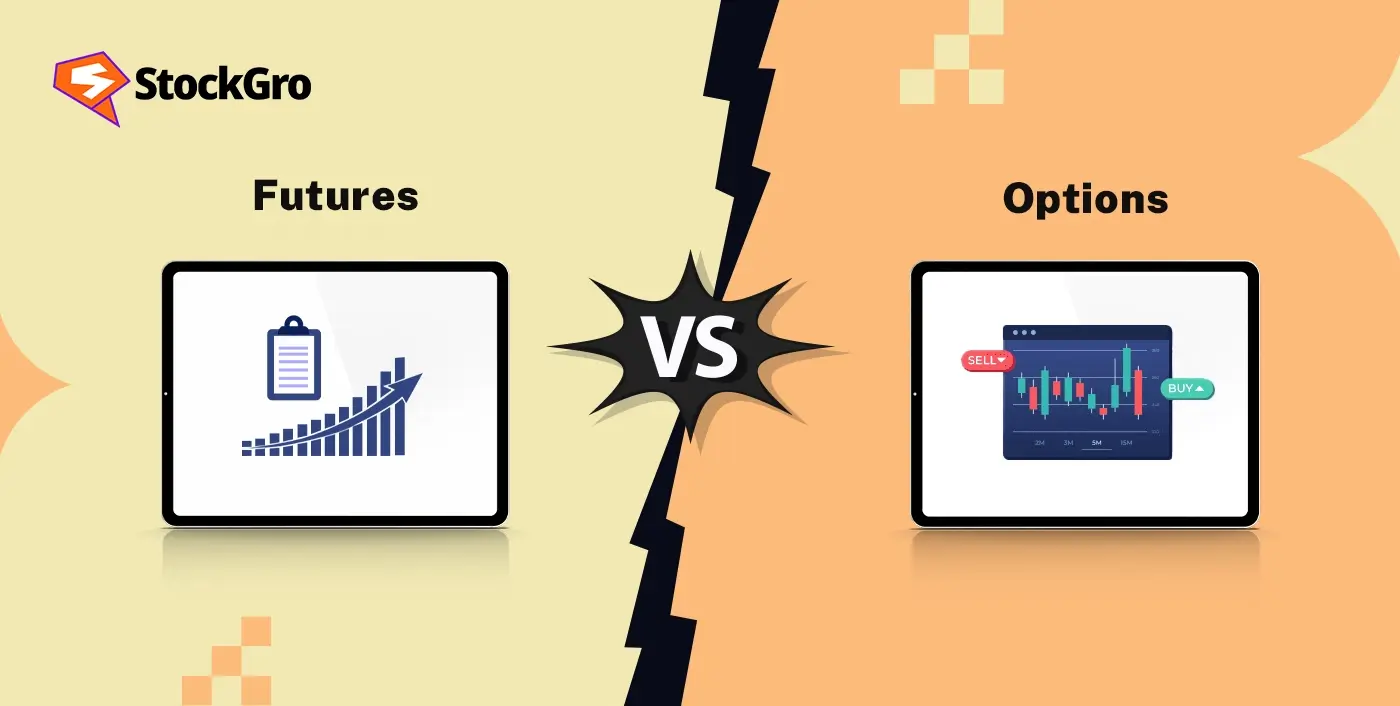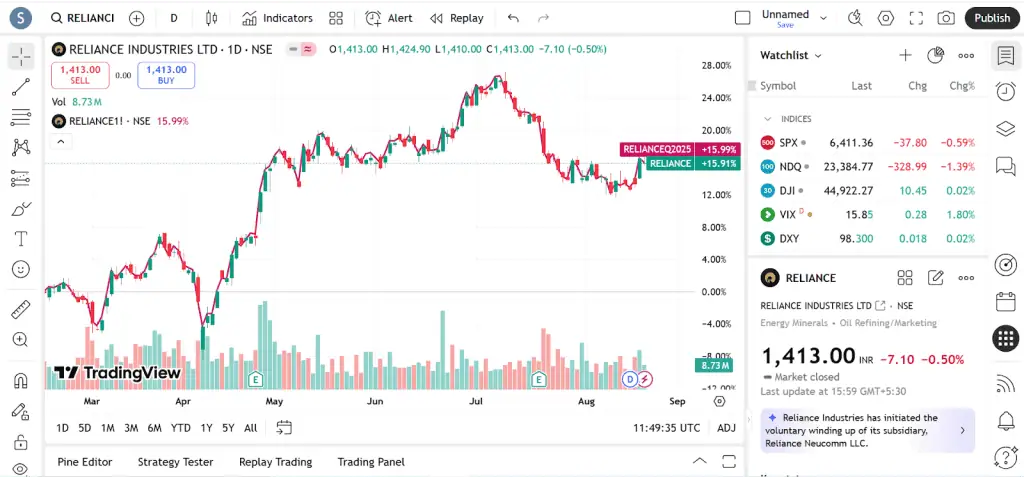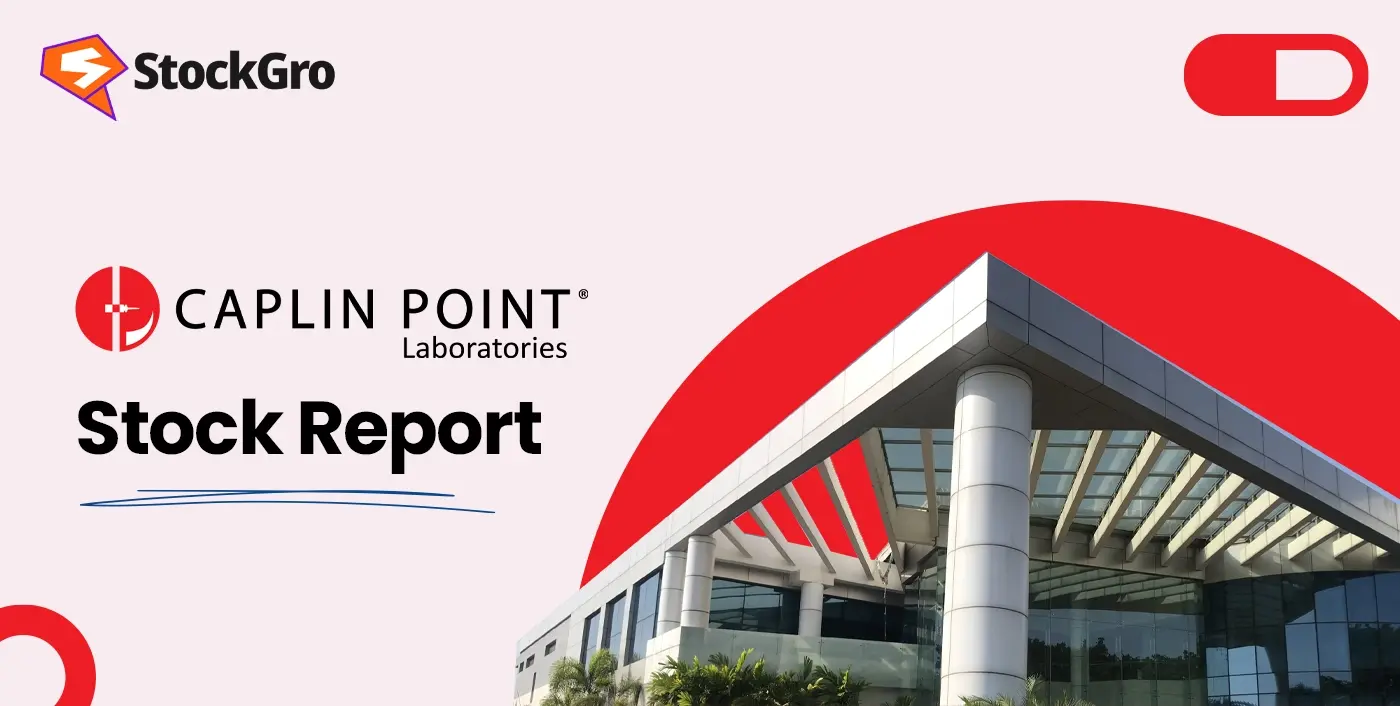
Thinking of trading, people often imagine buying and selling their underlying assets. But there’s an entirely different side of the financial markets where investors deal in derivatives. Options and Futures are popular kinds of derivatives, letting traders bet on the stock price, protect themselves from risk, and use leverage. They might look similar, but the trading and application process makes such a key difference between options and futures. Traders must recognise the difference between options vs futures.
What is an Options Contract?
An option contract is a type of derivative, offering the buyers control but doesn’t force them to buy or sell a stock at a fixed price before a set expiration date.
- A call option empowers buyers to purchase a stock.
- A put option empowers buyers to sell a stock.
For this reason, the buyer pays a fee (the premium) to the seller (known as the writer).
Assume a stock trades at ₹200 and you purchase a call option with a strike price of ₹ 210 and a three-month expiration. If the stock rises to ₹220, you can buy it at ₹210 and earn a profit. If the stock remains below ₹210, you just let the option terminate, where the maximum loss is the premium you paid for the options trading.
Options bring flexibility, where investors use them for hedging, speculation, or generating income. The most vital point is that options are not obligations, here the buyer decides whether to exercise them or not.
What is a Futures Contract?
A future contract is basically when two parties agree to trade a stock at a pre-set price on a definite date in the future. Unlike options, futures create a compulsion for both the buyer and the seller.
Let’s say, if you agree to buy crude oil at ₹ 6,000 per barrel in three months, you must complete the transaction when the contract expires, irrespective of the market price at that time.
Futures trading is widely used for supplies like wheat, gold, and oil, along with financial instruments like currencies or stock indexes. They are regulated and traded on an exchange, increasing their liquidity.
Future doesn’t involve any premiums like options. Rather, investors put down a margin deposit and must maintain it. Future also includes daily mark-to-market expenditure, which means profits and losses are planned and settled at the close of each trading day.
Options vs Futures: Key Differences
Obligation vs Right
Commitment makes a major difference.
- Options brings choices for buyers. If the contract is gainful, they can use it, but if it’s worthless, they can let it expire. However, the seller has an obligation once the buyer decides.
- Future brings binding obligations for both parties to finish the contract at expiry, irrespective of the market price.
This distinction between futures vs options trading makes futures more straightforward but options more flexible.
Expiration & Settlement
Options come with an expiry date and can be exercised before or on that date, depending on whether they’re European-style or American-style options. Options usually expire worthless if they have no value at expiry.
Futures also bring expiration dates, but never expire worthlessly. The agreement is finalised either by delivering the asset, i.e., physical settlement, or by paying the difference in cash, i.e., cash settlement. Future settlements regularly happen through mark-to-market, ensuring positions remain funded.
Margin Requirements
With options, buyers only pay the premium beforehand, making them low-priced to enter. Options sellers, however, must maintain margins as they are prone to facing unlimited risk.
Future demands margin money deposition for both buyers and sellers, acting as collateral for potential losses. Since futures are leveraged, minor price fluctuations can lead to maximising gains or losses.
Risk & Leverage
Options bring limited risk for buyers, where they can hardly lose the premium paid. However, sellers deal with a higher risk if the market is extremely unfavourable for them.
Future offers unlimited risks and rewards for both sides. With leveraged positions, even small market swings can lead to huge profits or losses, making future riskier for beginners.
Options vs Futures: Which is Better?
There is no universal solution. Choosing between options vs futures solely depends on your trading purpose, risk tolerance, and techniques.
- Options could be better if you opt for flexibility and defined risk.
- Future could be beneficial if you want direct exposure and don’t mind obligations.
To balance portfolios, institutional traders often use both. Let’s say, a company may use futures to lock in commodity prices while traders choose options to hedge against unexpected price swings.
When to Trade Options
Options are perfect when you:
- Want limited downside risk but expect significant movement in a stock or index.
- Wish to hedge your underlying asset holdings. Let’s say, buying put options can safeguard against price drops.
- Want to generate profit by writing covered calls.
With volatility or uncertainty, options stand out in the market, letting investors design strategies that profit in different conditions, whether the market goes up, down, or remains unchanged.
When to Trade Futures
Futures are perfect when you:
- Need a straightforward introduction to an index, currency, or commodity.
- Want to safeguard against price swings in financial instruments or raw materials.
- Prefer straightforward pricing with high liquidity.
Say, airlines lock in jet fuel prices using futures. Exporters apply currency features to safeguard against modifications in exchange rates. When investors want fast-moving markets and high leverage, they opt for futures.
Real-Life Example: Options vs Futures Trade

The futures contract (RELIANCEQ2025) and the underlying stock price (green) in this chart of Reliance Industries are practically moving in tandem with each other. As a result, this is typical of futures trading; the contract tracks the stock’s movement with little deviation for reasons like cost of carry or expiration. If this were a chart of options instead of a stock, you’d see that the prices of the options don’t move in tandem with the stock.
Their less straight and more curved chart is a result of their reliance on variables such as strike price, time to expiry, and volatility. Futures and options provide almost equal exposure to the stock’s price movements, but options provide leveraged exposure that changes behavior depending on market conditions, as shown in the chart.
Pros & Cons: Options vs Futures
Options Pros
- Limited Buyer Risk: If you buy an option, the most you can lose is the premium you paid. This makes it safer if you want to get involved without risking too much.
- Flexible Approaches: Options let traders create different plans like straddles, spreads, and covered calls. You can adjust them to how the market is doing, whether it’s being neutral, bearish, or bullish.
- Can Profit in Every Market: Where stocks generally demand upward movements to generate income, options can be structured to benefit from sideways moves, volatility, or even market declines.
Options Cons
- Expensive premiums: Option premiums are often high for popular stocks or volatile markets, making entry expensive.
- Time decay loses value while approaching expiry: While approaching expiry date, options start to lose value, which works against buyers holding long positions.
- Complex strategies may be difficult for beginners: Understanding volatility, pricing, and multi-leg strategies can be overwhelming for beginners, where misuse can result in rapid losses.
Futures Pros
- Extremely standardised and liquid: Futures contracts are traded on big exchanges having transparent rules, making them easy and clear for trading.
- No premiums needed beforehand: Unlike options, futures don’t demand any premium payment from you. All you need to do is to deposit margin, which is a fraction of the entire contract value.
- Easy pricing mechanism: Futures directly monitor the stock price, making valuation straightforward compared to the complex options pricing models.
Futures Cons
- Unlimited risk exposure: Futures obligate investors to buy or trade at expiry, which can cause huge losses if the market conditions are unfavourable for them.
- Demands margin maintenance: Futures investors are obliged to maintain margin levels. Brokers can issue margin calls, needing extra funds, if the market turns.
- Regular mark-to-market can be tough: Futures accounts are frequently balanced depending on market conditions, exposing investors to incessant swings and possible monetary challenges.
Conclusion
Both options and futures are prospective strategies for the trading markets, assisting investors in risk management, speculating on price swings, and differentiating portfolios. The most significant difference between options and futures is entirely about preferring flexibility vs obligation. Options authorise traders without pushing them to trade, which feels like a safe choice for many retail investors. Futures, however, are very uncertain, offering direct acquaintance and higher leverage.
Picking between options vs futures depends entirely on how you trade, what you aim to achieve, and your risk tolerance. A sensible investor recognises differences between futures vs options trading and applies them cautiously, aligning with their investment strategy.
FAQs
Options authorise buyers, but don’t pressurise them, to trade an asset at a set price before expiration. Futures, on the contrary, are binding agreements demanding that both parties transact the asset at a pre-set price and date. This means options vs futures contracts are all about flexibility vs obligation. Options demand a premium beforehand, but futures involve margin requirements. Generally, options vs futures indicate limiting risk for buyers vs exposing traders to unlimited potential losses.
Options can be gainful when the stock moves according to the trader’s anticipation. Assume, call options become valuable when prices rise, and put options benefit during price drops. Traders might also see profit using spreads or hedging. Futures generate profit when the price moves in the stock, where gains or losses are settled regularly through mark-to-market. A trader makes money if the price does what they think it will, but loses if it moves unfavourably.
Neither is entirely better between options vs futures; as it depends on trading objectives. If you are after limited risk and flexible strategies, and ready to lose the premium paid, options might be your thing. They are perfect for traders seeking a hedge or speculation with controlled exposure. Now, if you want to get right into things with simple pricing and high liquidity, futures could be a better fit. Futures can be more beneficial for protecting commodities or currencies. Picking the best strategy between options vs futures contracts depends on skill, risk tolerance, investment, and what you favour between flexibility and compulsion.
Between options vs futures, futures day trading is better as they offer high liquidity, have tight spreads, and maintain a straightforward pricing technique depending directly on the stock. Profits and losses are regularly calculated through mark-to-market, which fits perfectly with temporary strategies. Options, despite offering flexibility, can be challenging for day traders because of time decay, fluctuating set prices, and premium swings. However, for intraday volatility plays, experienced traders can still use options. Between options vs futures, futures offer cleaner, faster, and more efficient execution for most day traders.
Between options vs futures, options offer more safety to buyers because the maximum loss is limited to the premium paid, regardless of the market movement. This measured risk makes them the perfect choice for retail traders. Futures, however, involve unlimited risk as investors have to fulfil the contract, and unfavourable market conditions can create significant losses. Having said that, options sellers take on higher risks than buyers. In both cases, between options vs futures, safety depends on the trader’s approach, risk management, and skill to handle margin requirements efficiently.
Yes, choosing between futures vs options for hedging can be hard, as both are valuable tools. Futures let businesses and traders hold prices for commodities, currencies, or indexes, safeguarding against unfavourable market conditions. Let’s say, between futures vs options for hedging, an airline might use futures to protect fuel costs, while options are more flexible as they let you protect with limited loss possibility while retaining potential gain. Let’s say, buying put options protects against price drops while keeping profits if markets rise. Traders often pair up both instruments for comprehensive risk management strategies.
Options are generally less risky for buyers since the extreme loss is involved in the premium paid. However, selling options can expose traders to substantial or even unlimited risk. When you invest in the future, remember they’re riskier due to obligations and margin calls. Price changes can really affect how much money you make or lose, with no limit on possible downside. So, if you’re just starting out or not willing to take huge risks, options might be a better fit between options vs futures. Still, in skilled trading, both options and futures can be uncertain if you lack knowledge in risk management.

